Another week of Tampa Bay Lightning hockey is in the books, and it was the tale of two teams. On Tuesday, the Bolts nabbed a 3-1 victory over the Montreal Canadiens after scoring twice in 57 seconds, then earned a gritty 4-3 shootout win against the Boston Bruins on Thursday. However, in their first home game since Oct. 3, they laid an egg against the Colorado Avalanche, losing 6-2.
Related: Bolts Breakdown: Undisciplined and Inconsistent to Start the Season
After the loss to the Avalanche, the Lightning are 4-3-1 with nine points and plus-two goal differential. They’re in an unfamiliar position being fifth in the Atlantic Division, but in a week where they went 2-1, they easily could have finished 0-3. There have been some good and some bad this week, but the team is still trying to find its footing eight games into the season.
The Good
Shattenkirk’s Resurgence
The Lightning took a chance on defenseman Kevin Shattenkirk when they signed him to a one-year, $1.75-million contract in August, and it’s paying off so far. The blueliner already has four goals — two more than he scored in 73 games last season — and is playing nearly 21 minutes per game.
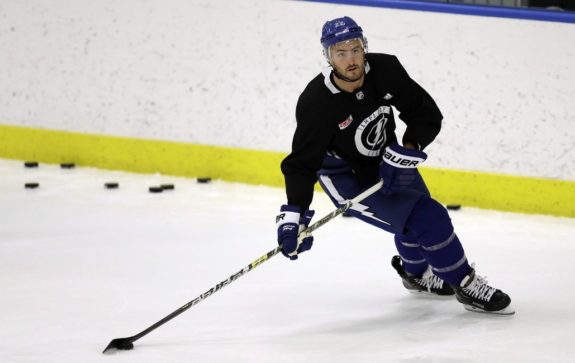
Shattenkirk has four points over his last five games, including two assists in the loss to the Avalanche. With seven points in eight games this season, it’s great to see that he finally appears to be healthy and can thrive as an offensive defenseman, even if that’s not necessarily what the Lightning need right now.
Vasilevskiy Strong But Hung Out To Dry
This might seem like a strange positive after Andrei Vasilevskiy just gave up six five-on-five goals to the Avalanche, but against the Canadiens and Bruins, he was perfect against five-on-five shots. He gave up one power play goal to the Canadiens and three to the Bruins, and against the Avalanche, nearly all of their goals were from high-danger areas.
The Avs’ first goal came on a defensive zone turnover that created a one-time opportunity in the slot, and the second goal was from the mid-slot because of poor defensive coverage. Vasilevskiy had no chance at even seeing the third goal as it was deflected through a screen by Gabriel Landeskog, and their fourth goal came off a neutral zone turnover that created a two-on-none chance. Nazem Kadri skated into the mid-slot for the fifth goal and beat Vasilevskiy up high, and on the sixth, Mikko Rantanen dangled the entire Lightning defense and scored on the backhand.
Vasilevskiy would tell you that he should have saved almost all of those, and while some were stoppable, it’s much harder when the defense gives up high-danger opportunities. As a whole this week, Vasilevskiy was a big reason they picked up four points instead of just two.
The Bad
Penalties… Again.
I think we’re starting to see a common theme here with the Lightning. For whatever reason, they can’t stay out of the penalty box. They were a bit better against the Avalanche, only giving up two power plays, but the Canadiens had five power play opportunities in Tuesday’s game and the Bruins scored on three of their five man advantages Thursday night. That could have cost the Lightning both of those games, and as it is, it gave the Bruins — an Atlantic Division rival — one point.

I said last week that the Lightning can take fewer penalties, but that’s much easier said than done. But, if they’re going to take penalties, the shorthanded units simply have to step up. Against the Bruins, Anthony Cirelli and Alex Killorn each played more than three minutes shorthanded, and defenseman Ryan McDonagh played nearly five minutes down a man. The Lightning also mixed in Shattenkirk, Erik Cernak and Victor Hedman, among others, on the penalty kill and those same players performed well against the Canadiens.
Related: Lightning Must Improve Their Penalty Kill
The penalty kill shouldn’t act like a faucet. Players can’t turn it on or off from game to game, and while the Lightning aren’t trying to do that, it appears that’s what has happened so far. The Bruins have a great power play, but the players on the Lightning’s shorthanded unit need to find some consistency when their name is called.
Giving Up Shots
It’s no secret the Lightning have some of the most talented players in the NHL on their team, but oftentimes they rely solely on an individual’s talent (thanks, Herb Brooks). That can mean players trying to do too much, getting out of position and giving up high-danger scoring chances, just like they did against the Avalanche. It also gives their opponents an opportunity to shoot more. Against the Canadiens, the Lightning were outshot 34-22, and the Bruins had a 37-36 edge on Thursday. However, against the Avalanche, the Lightning held the edge, 46-24.
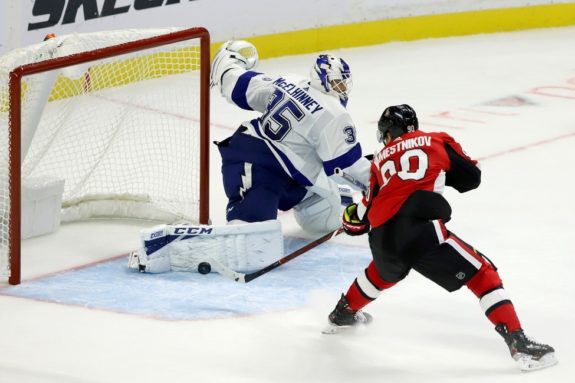
According to NHL.com, through their first six games this season, the Lightning averaged the fewest shots per game at 25.7 and they allowed 34.2 shots per game, third-most in the league. In their 4-3 overtime loss to the Carolina Hurricanes on Oct. 6, they were outshot 44-13. I’m not a mathematician, but you’re not going to win many games playing like that.
Related: Lightning: What We Learned After a Tough Road Trip
Again, it’s probably easier said than done, but the Lightning have to be more responsible defensively. A lot of the shots and goals they give up come from the middle of the ice, and defensemen need to force the play to the boards and get support from the forwards along the wall. Players have to want to block shots, as well. McDonagh leads the team with 18 blocks, Hedman has 15 and Cernak has 14, but everyone needs to chip in to prevent any type of scoring chance.
High-Danger Chances
So, the Lightning give up a lot of shots, but where do those shots come from? Well, a lot of them this season have come from the middle of the ice, specifically in the low and mid-slot. They had their best five-on-five game against the Bruins, but two of their three goals still came in the low slot.
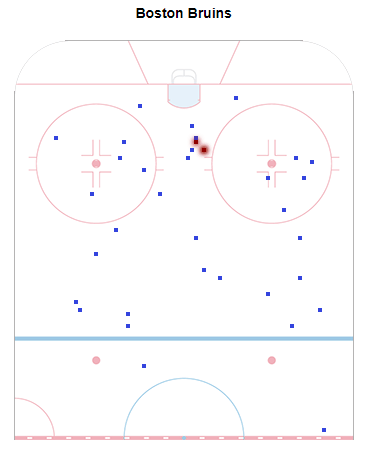
Against the Canadiens — a rather below-average five-on-five game from the Lightning aside from a three-goal scoring run — the only goal came on a slap shot from the point that was simply too hot to stop for Vasilevskiy. However, they still had nearly a dozen chances from in front of the net or in the slot.
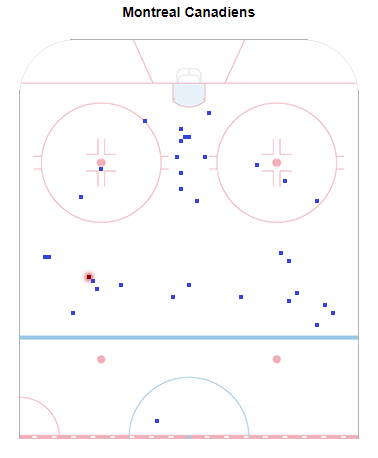
Shot chart from Tampa Bay Lightning vs. Montreal Canadiens on Tuesday, Oct. 15. (hockey-reference.com)
And then there’s the game against the Avalanche. Backup goaltender Pavel Francouz played a stellar game and stopped some good chances from the Lightning, but turnovers and poor play in the defensive zone by the Bolts allowed the Avalanche to capitalize on every scoring chance, and they executed to perfection.
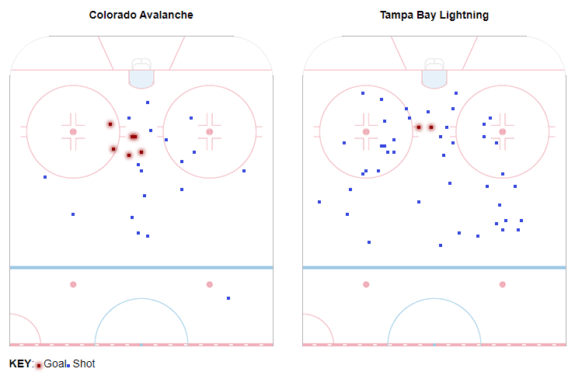
Shot chart from Tampa Bay Lightning vs. Colorado Avalanche on Saturday, Oct. 19 (hockey-reference.com)
Protecting the middle of the ice in their defensive zone should be the Lightning’s No. 1 priority now. They’re not going to prevent every scoring chance, but when a team scores six goals from essentially the same spot on the ice over the course of 60 minutes of hockey, something has to change.
The Lightning will have three days to regroup before hosting the Pittsburgh Penguins on Oct. 23, and I’m sure head coach Jon Cooper will put the team through at least a couple solid practice sessions. As for Lightning fans, no need to hit the panic button just yet. It’s still October and there are still more than 70 games left in the season. But, if the same issues are happening into December and January, then there’s a real problem.